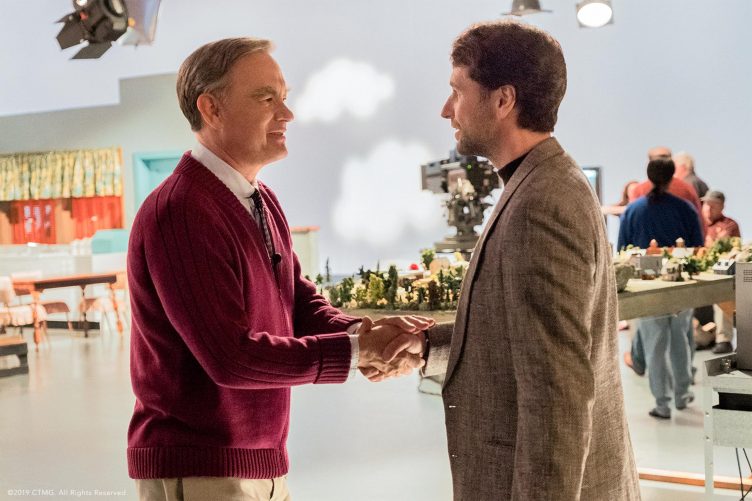
Like most children, I grew up watching Mister Rogers’ Neighborhood and Sesame Street on TV, even in mini-marathons when I was home sick from school. Unlike most children, I was picked on and beat up relentlessly by cowardly bullies in school. Fred Rogers was a nice, calming voice in my life when I really needed it and honestly spoke in a way that my parents and other adults just couldn’t. Long after my childhood, I never forgot his words or lessons, and we can certainly use a Mister Rogers in our world right now. Maybe that was the idea behind a new movie sort of (but not really) about Mister Rogers and his connection to a writer with issues. No amount of preparation can put you in the right mind-set for this film. A Beautiful Day in the Neighborhood results in a depressing day at the theater.
Lloyd Vogel (Matthew Rhys of The Americans and The Post) writes for Esquire and has a bad reputation because of his hatchet jobs and hit pieces. When his editor assigns him to interview Fred Rogers (Tom Hanks) for an issue on heroes, he grudgingly travels to Pittsburgh to talk to Rogers on the set of his TV show at WQED. Director Marielle Heller (Can You Ever Forgive Me?) and writing team Micah Fitzerman-Blue and Noah Harpster (Maleficent: Mistress of Evil) take the film not down the expected path of a biopic of Rogers, but they instead focus on Vogel and his relationships with his wife (Susan Kelechi Watson) and ailing father (Chris Cooper). Vogel struggles with his own feelings while the perfect person to help him cope has now become part of his life. Although based on the true story of a writer’s time with Rogers, many of the incidents feel inauthentic and manufactured for the movie. In this case, the truth would be stranger and more interesting than the fiction portrayed.
When I heard about Hanks as Mister Rogers, I couldn’t picture it until I saw him in costume and makeup. As one of America’s most reliable actors, Hanks sinks himself into his roles even if the films surrounding his performance like this one don’t deserve that level of effort. More important than the look, Hanks duplicates both the cadence of Rogers’s speech as well as the hesitancy that he used to wait for his words to sink in. The Hanks version of Rogers could have been the basis of a wonderful film instead of this saddening mess. Cooper’s Oscar-winning performance in 2002’s Adaptation confirmed what many of us liked about him for many years prior, and he makes this irritable old jerk at least watchable. Rhys comes off as bland. Maybe that was the filmmakers’ choice, but you don’t center a film on a performance that puts you in a coma. Watson doesn’t have enough scenes with Rhys to add some life to the mix, and when they do appear together, the characters are usually arguing or in the midst of a crisis.
The plot heads in the wrong direction right from the start like the Neighborhood trolley speeding out of Rogers’s TV house and going off the tracks. A wedding scene becomes too much of a diversion. Awkward interaction between Vogel and Rogers in which the latter talks through his puppets would make me storm out of the room like Vogel does. A weird dream sequence has no place here; this isn’t Alice in Wonderland. I lost my father two weeks before I saw this film, so you would think that I could empathize more than other moviegoers with Vogel’s attempts to reconnect with his father. Nope. The messy relationship scenes with the Vogels kill the pacing and take things into the realm of TV movies or after-school specials. With Hanks on board, I strongly wanted to take a nice visit back to the Mister Rogers of my youth instead of this melancholy journey. The better way to present Vogel’s story would have been as just one part of a number of vignettes to show Rogers’s influence on the lives of people in all walks of life.
Even with the misguided direction, there are still some positive aspects. The filmmakers built street and city models to represent the transitions of characters much like Rogers used in the opening sequence of his TV show. When Hanks as Rogers was digitally used to replace the real man in interviews with Arsenio Hall and Oprah Winfrey, I nostalgically thought of Hanks as Forrest Gump inserted into history. The many positive messages of Rogers make their way into the script, as in Rogers describing his work to Vogel as a way to “give children positive ways to deal with their feelings.” One scene redeems all of the negative aspects that I found and reinforces why I never make my final decision on a movie until the credits roll. Rogers says something important to Vogel, yet the camera switches so that Rogers is staring right at you to deliver some of the magic of Mister Rogers in a perfect moment that’s even better than the heartwarming bit with people singing to him on the subway.
It takes a lot of effort to make a movie, so when it goes wrong like this, some people usually share the blame. The filmmakers had good intentions of making a sort of Ebenezer Scrooge story with Mister Rogers as the Ghost of Christmas Make-Believe. Unfortunately, that’s not what people expected to see, and that dims the light of Mister Rogers a bit where he should shine bright. For a much better look at the man and his legacy, check out the wonderful 2018 documentary Won’t You Be My Neighbor? If that doesn’t bring a smile to your face and a tear or two to your eye, you weren’t paying attention to Mister Rogers enough as a kid.



